Does Apple slow old iPhones when a new model comes out?
Tests show that 'upgrading' to iOS 9 causes 'noticeable slowdown' in the iPhone 4S, 5 and 5S
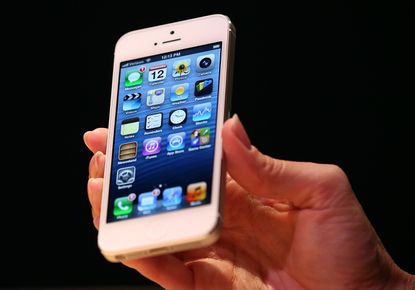
Side-by-side tests have shown that iOS 9 makes older iPhones perform more slowly, lending weight to long-held suspicions that Apple might deliberately make its older devices slow down to encourage users to upgrade to newer models.
Tests carried out by vloggers iAppleBytes, show that the latest mobile operating system, iOS 9.0.1 creates a "noticeable amount of slowdown with the new update", The Guardian reports.
Running the new software, the iPhone 4S, 5 and 5S models take longer to start up, have slower camera performance and take longer to launch and switch between apps, the vloggers show.
Subscribe to The Week
Escape your echo chamber. Get the facts behind the news, plus analysis from multiple perspectives.

Sign up for The Week's Free Newsletters
From our morning news briefing to a weekly Good News Newsletter, get the best of The Week delivered directly to your inbox.
From our morning news briefing to a weekly Good News Newsletter, get the best of The Week delivered directly to your inbox.
Some analysts have suggested that running updated software is more complicated for older devices, but this does not seem to be true on Android, The Guardian notes.
"Some updates – Google’s Android Lollipop in 2014 for example – focus on performance and optimisation, and can actually improve the speed of the smartphone or tablet they are installed on. This does not appear to be the case with iOS 9."
Last year, research in the US lent further weight to the deliberate slowdown theory. The study, compiled by Harvard University PhD student Laura Trucco, analysed worldwide searches for "iPhone slow" and found that the search term spikes massively around the time of new phone releases, The Times reports.
The study compared those results with similar searches for one of Apple's main rivals but found that the term "Samsung Galaxy slow" was unaffected by new releases from Samsung.
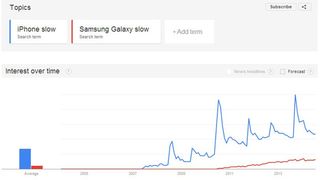
Writing for the New York Times, Sendhil Mullainathan, a professor of economics at Harvard, said that the results were "striking".
"Wouldn't many business owners love to make their old product less useful whenever they released a newer one?" Mullainathan wrote. "When you sell the device and control the operating system, that's an option".
On the other hand, conspiracy theorists might also see an economic reason for Google to hide search results displaying peaks of concern about the speed of Android operating systems built by Google and used in Samsung smartphones.
Mullainathan notes that the research does not prove that Apple has done anything wrong. "No matter how suggestive," he says, "this data alone doesn't allow you to determine conclusively whether my phone is actually slower and, if so, why."
He said that there are other plausible explanations for why an older model iPhone may slow down. The latest version of the Apple operating system, iOS, is always tailored to the newest device and may therefore not work as efficiently on older models.
Also, artificially slowing phones comes with many problems: "First, the legal risk," Mullainathan says. "Second, competition and consumer rationality should combine to thwart this strategy. All a competitor needs to do is to offer a smartphone that doesn't become a brick as quickly, and more people should buy it."
Apple did not respond to requests from The Times for comment.
Create an account with the same email registered to your subscription to unlock access.
Sign up for Today's Best Articles in your inbox
A free daily email with the biggest news stories of the day – and the best features from TheWeek.com
-
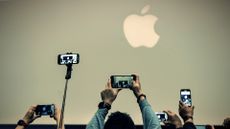 Justice Department bites Apple with iPhone suit
Justice Department bites Apple with iPhone suitSpeed Read The lawsuit alleges that the tech company monopolized the smartphone industry
By Rafi Schwartz, The Week US Published
-
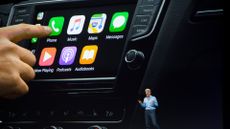 Apple kills its secret electric car project
Apple kills its secret electric car projectSpeed Read Many of the people from Project Titan are being reassigned to work on generative AI
By Peter Weber, The Week US Published
-
 The pros and cons of virtual reality
The pros and cons of virtual realityPros and cons The digital world is expanding, for better and for worse
By Devika Rao, The Week US Published
-
 The Apple Vision Pro's dystopian debut
The Apple Vision Pro's dystopian debutWhy everyone's talking about Is "spatial computing" the next big thing?
By Theara Coleman, The Week US Published
-
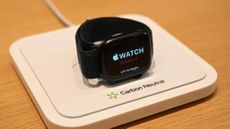 Why Apple's carbon-neutral claims may be misleading
Why Apple's carbon-neutral claims may be misleadingSpeed Read The company isn't disclosing all the information, a new report alleges
By Devika Rao Published
-
 The advent of the AI iPhone: does new tech show promise or peril?
The advent of the AI iPhone: does new tech show promise or peril?Talking Point Apple design guru Jony Ive and OpenAI founder Sam Altman believed to be in talks to create new device
By The Week Staff Published
-
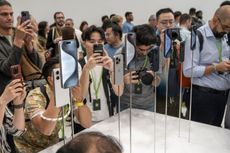 China steals the spotlight at Apple's iPhone 15 launch
China steals the spotlight at Apple's iPhone 15 launchHow will a directive from the Chinese government affect the tech giant?
By The Week Staff Published
-
 Why is a tiny change to the iPhone's charger such a big deal?
Why is a tiny change to the iPhone's charger such a big deal?Today's Big Question A change to comply with EU regulations could have global ramifications
By Justin Klawans Published


